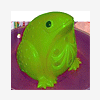-
Welcome to the eG Forums, a service of the eGullet Society for Culinary Arts & Letters. The Society is a 501(c)3 not-for-profit organization dedicated to the advancement of the culinary arts. These advertising-free forums are provided free of charge through donations from Society members. Anyone may read the forums, but to post you must create a free account.
All About Baking Pans (Cake, Sheet, Muffin)
-
Similar Content
-
Cake pan sizes 1 2
By Malawry,
- 41 replies
- 23,913 views
-
- 363 replies
- 89,281 views
-
Cake pan sizes 1 2
By Malawry,
- 41 replies
- 23,913 views
-
- 45 replies
- 14,255 views
-
- 52 replies
- 6,899 views
-
-
Recently Browsing 0 members
- No registered users viewing this page.




Recommended Posts